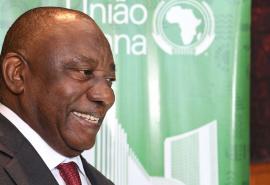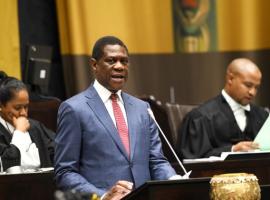
PRETORIA, Feb 2 (NNN-SANEWS) — South Africa places great importance on the African Union (AU) Summits, as the country forges ahead with its foreign policy of the advancement of the African agenda.
This is according to International Relations and Cooperation Minister, Dr Naledi Pandor, who was briefing the media on developments in her department.
The summit, which will take place on Feb 17-18 in Addis Ababa in Ethiopia, will focus on education.
Last year, the AU finalised a 10-year review of Agenda 2063.
A key recommendation, Pandor explained, is that the AU Member States must accelerate the implementation of the Agenda 2063 flagship projects that are aimed specifically at fast-tracking continental integration.
The project particularly focuses on trade and market integration, free movement of people and infrastructure development.
However, top of the agenda is the operationalisation of the African Continental Free Trade Agreement (AfCFTA), in which South Africa is playing a leading role.
“We are especially pleased that President [Cyril] Ramaphosa will officially witness the launch of South Africa’s first shipment and preferential trading under the AfCFTA on 31 January 2024, at the Port of Durban,” she said.
President Ramaphosa is expected to attend and participate in several high-level committee meetings of the Assembly.
These include the meeting of the Committee of African Heads of State and Government on Climate Change (CAHOSCC), which will be held to reaffirm Africa’s position on climate change as advocated during the Conference of the Parties (COP28) held in the United Arab Emirates last year.
In his capacity as the Chairperson of the Presidential Infrastructure Championing Initiative, the country’s First Citizen annually hosts a meeting on the margins of the AU Summit to provide a progress report on infrastructure projects.
The initiative aims to enhance infrastructure development in sectors such as transport, information communication and technology, water and sanitation, and energy in South Africa and throughout the region and continent.
These areas, she said, are critical to the implementation of the AfCFTA.
The President is also expected to chair a high-level meeting of the Committee of Five (C5) on South Sudan to review and provide political guidance on the progress made in the implementation of the revitalised agreement on the resolution of conflict in South Sudan.
She also announced that Egypt, Ethiopia, Iran, Saudi Arabia and the United Arab Emirates have confirmed they are joining the BRICS (Brazil, Russia, India, China and South Africa) bloc after being invited to last year.
“However, you’d be aware that Argentina has written to indicate that they will not act on this successful application by the previous administration to become full members of BRICS. And we accept their decision, particularly given that 30 countries have now written to Russia, expressing interest in becoming members.”
The Minister also touched on the recent summits of the Heads of State and Government of the Non-Aligned Movement (NAM) and the Group of 77 and China, convened in Uganda, last month.
She told journalists that the NAM Summit identified five priority areas.
These include regional and international peace and security; the fight against terrorism; migration and humanitarian crises; human trafficking; and the Sustainable Developmental Goals.
“In his statement to the NAM, President Ramaphosa confirmed that South Africa will remain steadfast in advancing its non-aligned approach to the maintenance of international peace and security by advocating for the peaceful political settlement of disputes and inclusive dialogue.”
Following the NAM meeting, Pandor led the South African delegation to the G77 and China Summit.
The G77 and China Summit is the largest negotiating bloc in the United Nations (UN) representing most developing countries and over 80% of the world’s population.
“The focus of the summit was on South-South cooperation in the areas of trade, investment, sustainable development, climate change, poverty eradication, and the digital economy,” she explained. — NNN-SANEWS





